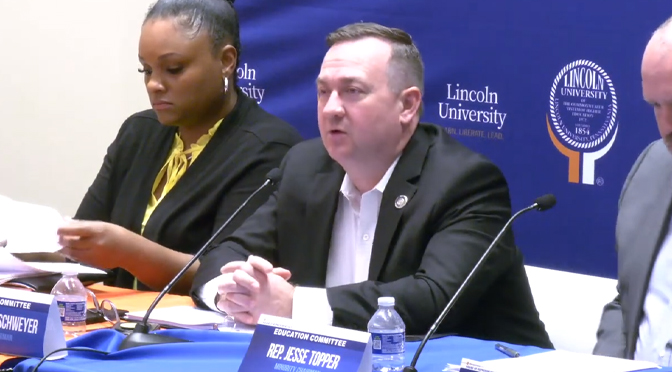|
|
HARRISBURG, May 2 – The Pennsylvania House Education Committee and Pennsylvania Legislative Black Caucus teamed up for a joint hearing Thursday afternoon to discuss financial support and initiatives for Historically Black Colleges and Universities.
State Rep. Peter Schweyer (D-Lehigh), Majority Chairman of the House Education Committee, co-hosted the hearing with state Rep. Napoleon Nelson (D-Montgomery), Chairman of the PLBC at the John Miller Dickey Hall at Lincoln University.
The hearing featured more than a dozen testifiers across three panels, who discussed the impacts and necessity for state funding to support the students attending HBCUs.
“Investments in higher education can literally be life-changing for many students and that is especially true for those in low-income communities,” said Schweyer. “Lincoln and Cheyney Universities not only provide safe learning environments and paths to success for students, but they are also part of Pennsylvania’s and the country’s history, and we need to ensure they continue their mission for generations of students to come.”
The hearing also featured testimony from Dr. Brenda A. Allen, President of Lincoln University, Aaron Walton, President of Cheyney University, as well as faculty members and students from both institutions to provide testimony on how these schools have been and continue to prepare students to learn, liberate and lead.
“As the nation’s first Historically Black College and University, Cheyney University represents a cornerstone of African American higher education,” said Walton. The institution has been a beacon of hope since 1837 and serves as a testament to the invaluable role of African American education through centuries and continues to serve as a sanctuary for the next generation of African American leaders and educators.”
“Most college students across the country face the pressures of school, work and family, worries about the future and an ever-increasing debt load. However, the students at HBCUs like Lincoln carry much greater loads and pressures, including coming from impoverished and frequently dangerous neighborhoods where family members may still be living there,” said Dr. Daniel N. Clay, Assistant Professor of Criminal Justice, Lincoln University. “It is important to acknowledge these disparities still exist and know that HBCU students are no less deserving, intelligent, motivated, driven or capable of unparalleled success than their peers.”
Thursday’s hearing can be viewed in its entirety here, while testimony can be found here.
Information provided to TVL by:
Thomas LeClair
Research Analyst
House Democratic Education Committee





